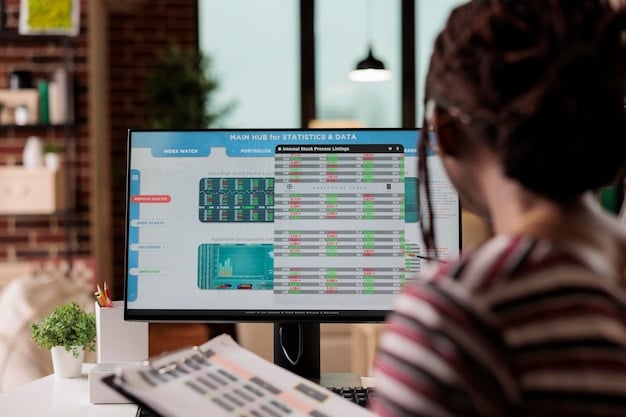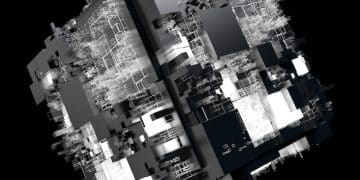REIT Modernization: How Technology Reshapes the Real Estate Industry

REIT modernization leverages technology to streamline operations, enhance property management, and improve investment strategies, ultimately boosting profitability and efficiency in the real estate sector.
The real estate landscape is undergoing a profound transformation, and at the heart of this shift lies the modernization of Real Estate Investment Trusts (REITs). REIT modernization: How technology is reshaping the industry is no longer a futuristic concept but a present-day reality. By embracing cutting-edge technologies, REITs are optimizing their operations, enhancing tenant experiences, and unlocking new avenues for growth.
Understanding the Imperative of REIT Modernization
In an increasingly competitive market, REITs are recognizing the critical need to modernize their approaches. Gone are the days of relying solely on traditional methods; today’s successful REITs are those that actively integrate technology into every facet of their business.
Why Modernization is Essential for REITs
There are several compelling reasons for REITs to embrace modernization:
- Enhanced Efficiency: Automation and digital solutions streamline processes, reducing operational costs and improving overall efficiency.
- Improved Decision-Making: Data analytics provide valuable insights, enabling REITs to make informed decisions about investments, property management, and tenant relations.
- Enhanced Tenant Experience: Modern technologies, such as smart building systems and mobile apps, improve tenant satisfaction and retention.
- Competitive Advantage: By embracing innovation, REITs can differentiate themselves from competitors and attract new investors.
Furthermore, modernization allows REITs to adapt to changing market dynamics and evolving tenant expectations. A failure to modernize can lead to stagnation, decreased profitability, and a loss of market share.
In conclusion, REIT modernization is not merely a trend; it is a necessity for survival and success in the modern real estate landscape. By embracing technology, REITs can unlock new opportunities for growth, improve operational efficiency, and provide superior value to their investors and tenants.
The Key Technologies Driving REIT Transformation

A variety of technologies are playing a pivotal role in reshaping the REIT industry. Let’s explore some of the most impactful:
The integration of technology is not just about adopting new tools; it’s about fundamentally changing the way REITs operate and create value.
Cloud Computing
Cloud computing provides REITs with scalable and cost-effective solutions for data storage, application hosting, and software access. This eliminates the need for expensive on-premises infrastructure and enables greater flexibility and collaboration.
Big Data and Analytics
Big data and analytics enable REITs to collect, analyze, and interpret vast amounts of data from various sources. This provides valuable insights into market trends, tenant behavior, and property performance, allowing REITs to make more informed decisions.
- Predictive Analytics: Forecast future trends and anticipate potential risks.
- Market Analysis: Identify investment opportunities and assess market conditions.
- Tenant Segmentation: Understand tenant needs and preferences to improve satisfaction and retention.
By leveraging big data and analytics, REITs can optimize their investment strategies, improve property management practices, and enhance tenant relations.
In conclusion, the technologies driving REIT transformation are diverse and powerful. By embracing these technologies, REITs can unlock new levels of efficiency, gain a competitive edge, and deliver superior value to their stakeholders.
Smart Building Technologies and the Tenant Experience
Smart building technologies are revolutionizing the tenant experience, transforming properties into connected, efficient, and user-friendly spaces. These technologies enhance comfort, convenience, and productivity for tenants, while also providing REITs with valuable data and insights.
The modern tenant experience is increasingly defined by technology, and REITs that embrace smart building solutions are well-positioned to attract and retain top tenants.
Key Smart Building Features
Smart building technologies encompass a wide range of features, including:
- Smart Lighting and HVAC: Optimize energy consumption and create comfortable environments.
- Access Control Systems: Enhance security and streamline building access.
- Smart Elevators: Improve elevator efficiency and reduce wait times.
- Occupancy Sensors: Monitor space utilization and optimize resource allocation.
Benefits for Tenants and REITs
The benefits of smart building technologies extend to both tenants and REITs:
- Enhanced Comfort and Convenience: Tenants enjoy personalized environments and seamless access to building amenities.
- Improved Productivity: Smart building features promote productivity and collaboration.
- Reduced Energy Consumption: Smart building systems optimize energy usage, reducing operating costs for REITs and lowering utility bills for tenants.
- Data-Driven Insights: REITs gain valuable data on building performance and tenant behavior, enabling them to make informed decisions.
In conclusion, smart building technologies are transforming the tenant experience and providing REITs with a competitive edge. By investing in these technologies, REITs can create value for their tenants, improve operational efficiency, and enhance their bottom line.
The Role of Automation in REIT Operations
Automation is playing an increasingly critical role in streamlining REIT operations, reducing costs, and improving efficiency. By automating repetitive tasks and processes, REITs can free up their employees to focus on more strategic initiatives.
The adoption of automation is not just about reducing costs; it’s about creating a more agile, efficient, and responsive organization.
Areas Where Automation Can Be Applied
Automation can be applied to various areas of REIT operations, including:
- Lease Administration: Automate lease renewals, rent collection, and tenant communication.
- Maintenance Management: Automate work order processing, vendor management, and preventative maintenance scheduling.
- Financial Reporting: Automate data collection, report generation, and financial analysis.
By automating these tasks, REITs can significantly reduce manual labor, minimize errors, and improve overall operational efficiency.
Benefits of Automation
The benefits of automation for REITs are numerous:
- Reduced Costs: Automation can significantly reduce labor costs and improve resource utilization.
- Improved Efficiency: Automated processes are faster, more accurate, and more consistent than manual processes.
- Enhanced Accuracy: Automation reduces the risk of human error, improving the accuracy of data and reports.
- Increased Productivity: By automating repetitive tasks, employees can focus on more strategic and value-added activities.

In conclusion, automation is a powerful tool for streamlining REIT operations and improving overall efficiency. By embracing automation, REITs can reduce costs, enhance accuracy, and free up their employees to focus on more strategic initiatives.
Data Security and Cybersecurity in the Age of REIT Modernization
As REITs increasingly rely on technology and data-driven decision-making, data security and cybersecurity become paramount. REITs must implement robust security measures to protect sensitive data from cyber threats and ensure the privacy of their tenants and investors.
Data security is not just a technical issue; it’s a business imperative. A data breach can have severe consequences for a REIT’s reputation, financial performance, and legal standing.
Key Cybersecurity Threats Facing REITs
REITs face a variety of cybersecurity threats, including:
- Ransomware Attacks: Cybercriminals encrypt critical data and demand a ransom for its release.
- Data Breaches: Unauthorized access to sensitive data, such as tenant information or financial records.
- Phishing Attacks: Cybercriminals use deceptive emails or websites to trick individuals into revealing their credentials or personal information.
Best Practices for Data Security
REITs should implement a comprehensive cybersecurity strategy that includes:
- Regular Security Assessments: Identify vulnerabilities and assess the effectiveness of security controls.
- Employee Training: Educate employees about cybersecurity threats and best practices.
- Strong Passwords and Multi-Factor Authentication: Protect user accounts from unauthorized access.
- Data Encryption: Encrypt sensitive data both in transit and at rest.
- Incident Response Plan: Develop a plan to quickly and effectively respond to data breaches.
In conclusion, data security and cybersecurity are critical considerations for REITs in the age of modernization. By implementing robust security measures and adhering to best practices, REITs can protect their data, mitigate cyber risks, and maintain the trust of their tenants and investors.
The Future of REITs: Embracing Continuous Innovation
The future of REITs hinges on their ability to embrace continuous innovation and adapt to evolving market dynamics. As technology continues to advance and tenant expectations continue to evolve, REITs must remain agile and proactive in their approach to modernization.
The most successful REITs of the future will be those that embrace a culture of innovation and actively seek out new ways to leverage technology to create value.
Emerging Technologies to Watch
Several emerging technologies have the potential to further transform the REIT industry:
- Artificial Intelligence (AI): AI can be used to automate tasks, analyze data, and personalize tenant experiences.
- Blockchain Technology: Blockchain can be used to streamline transactions, improve transparency, and enhance security.
- Virtual and Augmented Reality (VR/AR): VR/AR can be used to create immersive property tours, visualize design concepts, and enhance tenant engagement.
The Importance of a Flexible and Scalable Infrastructure
To effectively leverage these emerging technologies, REITs need to invest in a flexible and scalable infrastructure that can adapt to changing needs. This includes:
- Cloud-Based Solutions: Cloud computing provides the scalability and flexibility needed to support rapid innovation.
- Open APIs: Open APIs allow REITs to integrate different systems and applications seamlessly.
- Data Analytics Platforms: Data analytics platforms provide the tools needed to collect, analyze, and interpret data from various sources.
| Key Point | Brief Description |
|---|---|
| 💡 Modernization Imperative | Essential for efficiency, decision-making, tenant experience and competitive edge. |
| 🏢 Smart Buildings | Enhances comfort, reduces energy use, improves access, and provides data insights. |
| 🔒 Cybersecurity | Critical for protecting data and maintaining trust, including employee training. |
| 🤖 Automation | Streamlines lease administration, maintenance & financial reporting, reducing costs & errors. |
Frequently Asked Questions
▼
REIT modernization refers to the adoption of technology and innovative strategies to improve the efficiency, productivity, and competitiveness of Real Estate Investment Trusts.
▼
Technology enables REITs to streamline operations, improve tenant experiences, make data-driven decisions, and stay competitive in a rapidly evolving market.
▼
Smart building technologies include systems that automate and optimize building functions, such as lighting, HVAC, security, and energy management, to enhance comfort and efficiency.
▼
Automation can streamline lease administration, maintenance management, and financial reporting, reducing costs, minimizing errors, and freeing up employees for strategic tasks.
▼
Key threats include ransomware attacks, data breaches, and phishing attacks, which can compromise sensitive data and disrupt operations. Strong security measures are essential.
Conclusion
In conclusion, the modernization of REITs through technology is not merely an option but a necessity for sustained success. REITs that embrace these advancements will be best positioned to thrive in the evolving real estate landscape, delivering superior returns to investors and creating exceptional experiences for tenants.





